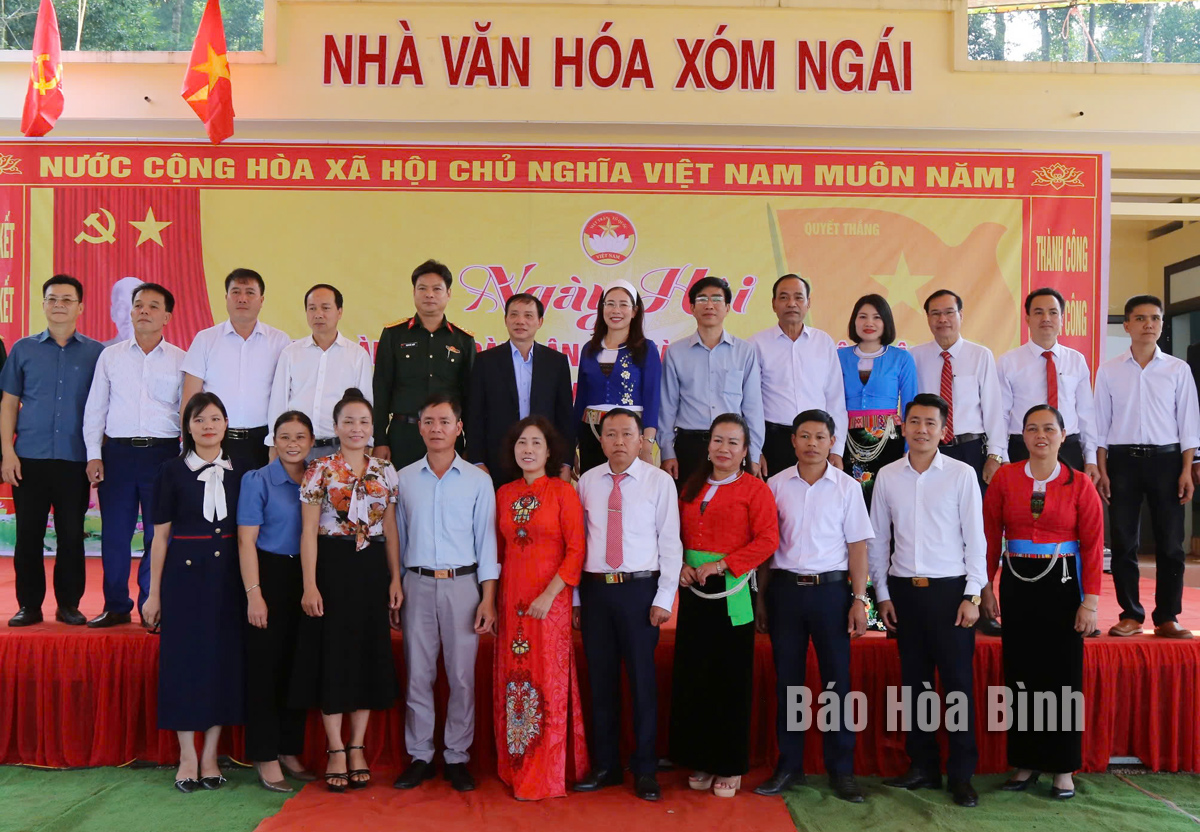
In recent years, under the leadership of the provincial Party Committee and People’s Council, and through the concerted efforts of local Party organisations, authorities, and ethnic communities, Hoa Binh province has achieved significant progress in implementing ethnic affairs and policies. These efforts have brought a new face-lift to ethnic-minority-inhabited and mountainous areas, according to Ha Van Di, Head of the Ethnic Affairs Board of Hoa Binh province.
Bui Van Khanh, Deputy Secretary of the Hoa Binh provincial Party Committee and Chairman of the provincial People's Committee, and other delegates attend the great national unity and military-civilian culture festival in Ngai hamlet, Thach Yen commune, Cao Phong district
The economic situation and livelihoods of ethnic communities in the province remain stable, with social welfare ensured and public safety maintained. Ethnic groups have fostered a strong sense of solidarity, mobilising internal resources to actively work, study, and boost economic development. Improvements in the material and spiritual lives have contributed to narrowing the development gap between ethnic and mountainous areas and other regions.
Notably, the poverty rate in ethnic-minority and mountainous areas has decreased by 3.36% on average annually, with extremely disadvantaged communes achieving an annual reduction of 6.4%. Currently, 62% of communes or 80 out of a total of 129 have met new-style rural development standards, including 14 extremely disadvantaged and seven disadvantaged communes. An additional six extremely disadvantaged communes are expected to meet these standards by the year-end. Rural infrastructure continues to improve, social welfare policies are effectively implemented, and national defence and security are firmly upheld.
These achievements stem from the commitment and responsibility of Party committees and authorities, who prioritise regular dissemination of information to enhance the effectiveness of ethnic policy implementation. Authorities actively monitor socio-economic conditions and the aspirations of local communities, addressing challenges promptly to prevent "hot spots" at the grassroots level. Collaborative efforts among various sectors have been strengthened, with a focus on the implementation, oversight, and evaluation of ethnic programmes, projects, and policies, particularly national target programmes.
Efforts also prioritise developing a strong contingent of ethnic minority leaders and enhancing the roles of reputable individuals, village elders, and community leaders within ethnic groups.
Looking ahead, ethnic minority communities in Hoa Binh are encouraged to continue promoting patriotic movements and innovative labour, in combination with Directive No. 05-CT/TW, issued by the Politburo on May 15, 2016, to advance the study and following of President Ho Chi Minh’s thought, morality, and style. These initiatives contributed to the broader national goal of building a prosperous, strong, fair, democratic, and civilised society.
For the 2024-2029 period, Hoa Binh aims to achieve several key targets, including lifting the per capita income of ethnic minorities in rural areas to half the national average and reducing the poverty rate among ethnic minorities by 2.5-3% annually, and by 4-4.5% in extremely disadvantaged communes.
Over 90% of ethnic minority farming households will engage in commercial agriculture and forestry while ensuring over 90% of communes and villages in ethnic minority and mountainous areas have basic infrastructure to support socio-economic development and improve living standards.
The ethnic communities of Hoa Binh remain united and determined to collaborate with the province's political system to realise these ambitious goals, creating a brighter future for all.
The Department of Education and Training of Hoa Binh province held a conference on March 18 to review the performance of the "Safe and Happy School" Project and set out tasks for 2025. The project, funded by the Taiwan Fund for Children and Families (TFCF), aims to create a safe, inclusive, and supportive learning environment for students. The event saw the attendance of representatives from the TFCF and 26 beneficiary schools.
With over 70% of their workers being women, trade unions across industrial parks (IPs) in Hoa Binh have been actively safeguarding their legal rights and interests while implementing initiatives to improve their income and well-being.
In recent years, the Hoa Binh provincial General Hospital has continuously innovated itself and improved the quality of medical services to meet the increasing needs of local people. With substantial investments in infrastructure and modern equipment, along with a team of highly qualified doctors and nurses, the hospital has gradually established itself as one of the leading medical units in the Northwestern region and a trusted destination for healthcare for people inside and outside the province.
From mastering the fundamentals of programming to achieving national recognition, the Programming Club of the Le Van Tam Primary School (STAR LVT28) in Hoa Binh city has made remarkable strides in the field of robotics.
The Ho Chi Minh Communist Youth Union Committee and the Vietnam Youth Federation chapter of Hoa Binh province organised a programme on March 12 to launch the "Digital Literacy" movement and an online quiz on the resolutions of the Vietnam Youth Federation congresses at all levels, as well as the Politburo's Resolution No. 57-NQ/TW on breakthroughs in the development of science, technology, innovation, and national digital transformation.
As climate change grows more unpredictable, the development of production forests has become essential - not just for economic growth, but for safeguarding the environment and maintaining ecosystem balance. By boosting local incomes, curbing natural disasters, preventing soil erosion, and protecting water resources, these forests play a crucial role in sustainable development.



